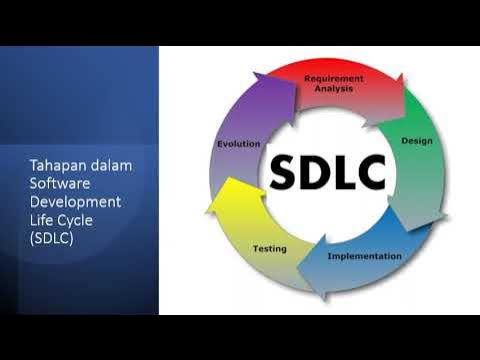Mengenal SDLC (Software Development Life Cycle)
Summary
TLDRThis video provides an insightful overview of the Software Development Life Cycle (SDLC), emphasizing its importance in creating high-quality software. It covers key SDLC models, focusing on the Waterfall model, which is simple and structured but best suited for smaller, less complex projects. The video explains the five stages of Waterfall—requirements analysis, design, development, testing, and maintenance—and outlines its advantages, such as clear organization, as well as its drawbacks, including long development times and inflexibility for large-scale projects. The speaker also touches on customized SDLCs, where models like Waterfall and Agile are combined for specific needs.
Takeaways
- 😀 SDLC (Software Development Life Cycle) is a crucial process for creating high-quality software, ensuring it benefits users, developers, and businesses.
- 😀 The Waterfall model is one of the oldest and simplest SDLC approaches, known for its sequential, step-by-step structure.
- 😀 The stages of the Waterfall model include: Requirements Analysis, Design, Development, Testing, and Maintenance.
- 😀 The first stage, Requirements Analysis, focuses on understanding the software's features and user expectations.
- 😀 In the Design phase, the architecture, UI/UX, and database structure of the software are planned out.
- 😀 During Development, the design is converted into actual code by developers.
- 😀 Testing is essential to ensure the software works as expected, with bug fixing and user feedback incorporated.
- 😀 Maintenance is the final stage, involving continuous updates and improvements to the software post-launch.
- 😀 Waterfall has advantages, such as clear structure, predictable timelines, and ease of management for smaller projects with low complexity.
- 😀 However, the Waterfall model can be inefficient for large, complex projects due to its rigid, non-overlapping stages and lengthy development time.
- 😀 Many companies customize SDLC to suit their needs, combining methodologies like Waterfall and Agile to better fit business requirements.
Q & A
What is SDLC?
-SDLC, or Software Development Life Cycle, is a process used for creating software that is of good quality. It involves several stages, including requirement analysis, design, development, testing, and maintenance, aimed at delivering software that benefits both users and businesses.
Why is understanding SDLC important for software developers?
-Understanding SDLC is crucial because it is a fundamental framework for developing software. Companies, especially startups, typically inquire about candidates' knowledge of SDLC to ensure they can contribute effectively to software development projects.
What are the key features of a 'good' software according to the presenter?
-A good software is not only beneficial for the business but also for the users and the developers. It should be user-friendly, easy to maintain, and regularly updated with improvements and new features.
What are the five stages of the Waterfall model?
-The five stages of the Waterfall model are: 1) Requirement Analysis, 2) Design, 3) Development, 4) Testing, and 5) Maintenance.
What happens in the 'Requirement Analysis' stage of SDLC?
-In the Requirement Analysis stage, the software's necessary features and user expectations are identified. This phase is typically handled by system analysts and lasts from one to two weeks.
What is the focus of the 'Design' phase in the Waterfall model?
-During the Design phase, the software's user interface (UI) and technical aspects, such as the architecture and database, are designed. This stage results in prototypes and blueprints for the software.
What occurs during the 'Development' phase of SDLC?
-In the Development phase, programmers convert the designs into actual code. This is where the software is built, and the technical implementation of the features takes place.
What is the purpose of the 'Testing' phase in SDLC?
-The Testing phase involves checking the software for bugs or issues to ensure it works as expected. This stage includes Alpha and Beta testing to verify that the software meets user expectations and works reliably.
Why is the 'Maintenance' phase crucial for software?
-The Maintenance phase ensures the software is updated and improved over time. Regular updates and improvements are necessary to fix bugs, enhance features, and keep the software relevant for users.
What are the advantages of using the Waterfall model?
-The advantages of the Waterfall model include its clear, structured approach where each phase is completed before moving on to the next. It is also well-suited for small, less complex projects due to its simplicity and ease of management.
What are the drawbacks of the Waterfall model?
-The main drawbacks of the Waterfall model include long development times, as each phase must be completed before moving to the next. This also leads to higher costs and makes it unsuitable for large, complex projects that require flexibility and iterative development.
What is a customized SDLC, and why do industries use it?
-A customized SDLC is a modified version of standard SDLC models like Waterfall or Agile, tailored to fit the specific needs and working habits of a company. Industries customize SDLC to improve efficiency and ensure the process aligns with their project and business requirements.
Outlines

Этот раздел доступен только подписчикам платных тарифов. Пожалуйста, перейдите на платный тариф для доступа.
Перейти на платный тарифMindmap

Этот раздел доступен только подписчикам платных тарифов. Пожалуйста, перейдите на платный тариф для доступа.
Перейти на платный тарифKeywords

Этот раздел доступен только подписчикам платных тарифов. Пожалуйста, перейдите на платный тариф для доступа.
Перейти на платный тарифHighlights

Этот раздел доступен только подписчикам платных тарифов. Пожалуйста, перейдите на платный тариф для доступа.
Перейти на платный тарифTranscripts

Этот раздел доступен только подписчикам платных тарифов. Пожалуйста, перейдите на платный тариф для доступа.
Перейти на платный тарифПосмотреть больше похожих видео

💡Etapas del ciclo de vida del Software 👉 en ❝4 minutos❞❗📰

Sub Topic 1

Macam-macam siklus hidup dalam pengembangan proyek | kelompok 8 | X.B

Pengantar Rekayasa Perangkat Lunak (Software Engineering)

RPL - 01 Pengenalan Rekayasa Perangkat Lunak

05 - System Analysis and Design | What is SDLC | Phases of SDLC | Importance of SDLC
5.0 / 5 (0 votes)
